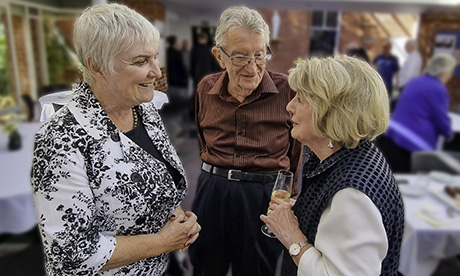The Catholic Church has “lost the plot” and needs to rethink its media strategy according to Emeritus Bishop of Auckland Patrick Dunn. – Originally reported 2 May, 2022.
Dunn made the comment at a farewell lunch for Dame Lyndsay Freer, who for so long was the voice and face of Catholic Communications in New Zealand, and latterly communications spokesperson for the Auckland Diocese.
Freer has been involved in church communication for over 37 years. The Auckland Diocese on Saturday marked her significant contribution with a light lunch for 40 people at the Pompallier Diocesan Centre.
A once regular in the nation’s media, Freer modernised Catholic communications in New Zealand.
Auckland based, she fronted the Church’s engagement with media reporters and journalists who regularly contacted her for comment.
Freer showed that modern communication, a subtle art, is conversational, and how something is said is as important as the substance.
An excellent judge of the mood and tone of the message, Freer knew the right touch and the media’s ability to receive what she was saying.
There were many times when she did not want to comment, did not want to have her voice or her image associated with a range of topics, yet she fronted, always using the opportunity to sow a seed, make a point or simply to keep the relationship and the conversation open for the next media request.
A professional, she respected the media but in line with Pope John Paul II’s catchphrase, she was not afraid.
Emeritus Bishop of Auckland Patrick Dunn led the speeches at the farewell.
Dunn told the gathering that the Church has been very fortunate to have had Freer in this pivotal role for so long.
“The Church in New Zealand was the envy of Churches in other countries,” Dunn said.
He commented that other churches were astounded with what New Zealand was able to achieve in having such a competent, talented and articulate person to help explain Church positions in the media.
It was a point reinforced after lunch when a guest commented that Freer gave Catholics and Christianity comfort in their faith and helped give them reason to believe.
Dunn praised former Auckland bishop Denis Browne’s inspirational move to employ Freer initially as Auckland’s communications spokesperson.
Competence has its detractors
Changing Catholic communications in New Zealand to engage with the media proved a threat to some people in the Church.
Something had changed in and around the bishops’ conference.
Dunn explained that there was an idea surrounding the Conference that the New Zealand Church should have a variety of voices presenting the bishop’s views to the media.
“I felt at the time that this was a mistake.
“I am now even more firmly convinced that we (the bishops) lost the plot.
“The Church has lost ‘brand recognition’ since Lyndsay stepped down from the national role,” said Dunn.
Implying the bishops’ new model of Catholic communications is a lost opportunity, he suggested it may be a case of the Church talking more to itself than engaging in dialogue with the world.
Dunn says the decision has almost removed the church from the public eye.
Accentuating the positive of the previous communication model, Dunn said Freer epitomised professionalism, competence and respect and cited a recent example of how she even dealt with a media call at 9 pm on Good Friday!
“Talkback hosts, newspaper reporters or TV news producers sometimes do not know who to call if they want a quick and always ‘immediate’ comment from the Church.
“I thought it ironic that, even after her retirement, Radio NZ still phoned her at 9pm on Good Friday for some comments on how church attendances were going with the change to the Orange Covid Traffic Light.
“Lyndsay had no idea where to refer them at that hour so made a quick comment herself which was then quoted on radio news bulletins for most of Holy Saturday morning!”
“It proves my point that the NZ Catholic Church does need to rethink our media strategy,” said Dunn.
Speaking with CathNews afterwards, a guest agreed with Dunn, saying the people of God are blessed with many God-given gifts and posed the question why we (the Church) are not using them.
“Seminaries teach people the likes of philosophy, scripture and theology. They encourage an interior life of prayer. Ordination is no guarantee bishops and priests have skills other than what the seminary taught them,” she said.
Also at the lunch was media trainer and RNZ host, Jim Mora, who commented that people in the media who might not be sympathetic to the message respected Freer, the messenger, because of her expertise, professionalism and her manner in relating to them.
Long-time media training specialists and now friends of Freer, Brian Edwards and Judy Callingham also joined the occasion.
Pope Francis, in a 2020 message to the Catholic Press Association, urged Catholic media to build bridges, defend life and break down visible and invisible walls that prevent dialogue and truthful communication between individuals and communities.
At the initial outbreak of Covid-19, Francis commented “recent months have shown how essential is the mission of the communications media for bringing people together, shortening distances, providing necessary information, and opening minds and hearts to truth.”
Additional sources
- Supplied
- Vatican News
Additional reading
News category: New Zealand.




